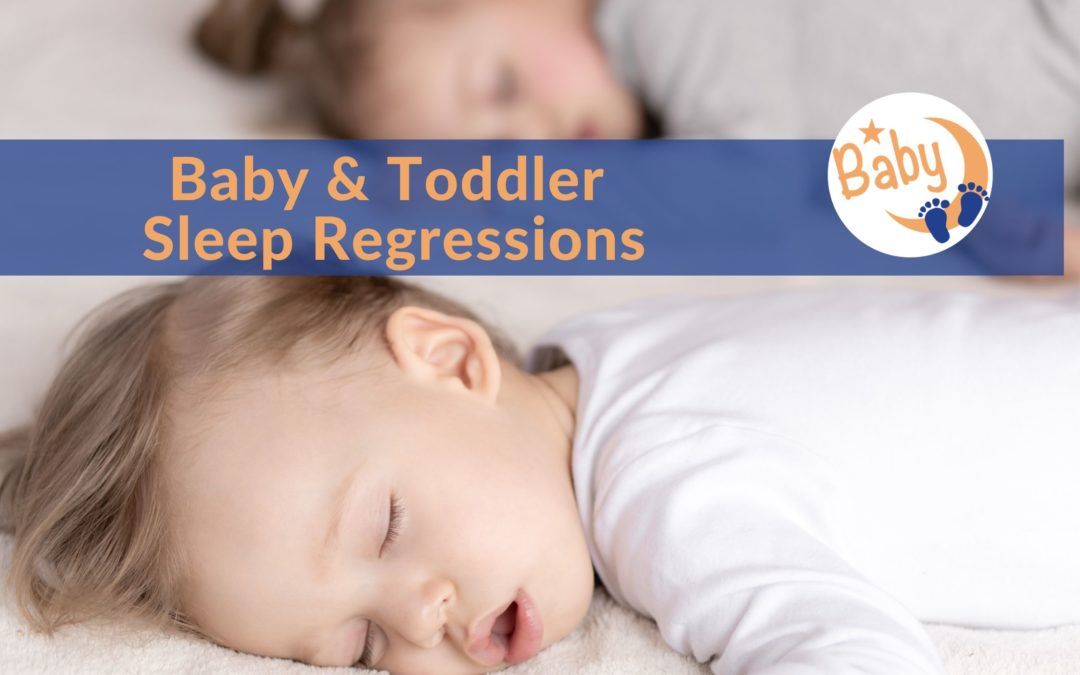Baby & Toddler Sleep Regressions |
What is a sleep regression?
It is actually a PROgression in terms of baby development due to normal leaps like rolling over, sitting, crawling, standing up, walking, talking etc. which usually impacts their sleep. Even if all these sound a bit challenging for the entire family, we should not be afraid of any sleep regression. Because they are fully NORMAL and they shall pass. Moreover, it helps to remember that except for sleep, everything else is going forward! 🙂
4-month sleep regression
This is a cognitive, physical and emotional developmental leap which could disrupt baby’s sleep significantly. It consists of catnapping during the day, fussiness and several wake-ups during the night (even every 2 hours) due to big changes in baby’s sleep cycle architecture causing overtiredness. Sometimes this regression happens together with a growth spurt, which means mom might need to feed the baby more, especially during the day and in the evening to meet baby’s hunger needs.
6-month sleep regression
It is usually a mild one and it occurs as their nervous system matures.
Many babies at 6 months are undergoing significant physical and mental growth and reaching several development milestones. Awareness of their environment increases, they become more responsive to sounds, engage in more laughing and babbling, and they may gain physical abilities like rolling over or sitting unassisted. They may be more sensitive to overstimulation, separation anxiety or other disturbances in their environment. All of these factors may play a role in your baby’s activity level and impact its sleep habits during the day and night.
This regression can be in the form of more wake-ups at night with more difficulty falling back asleep, practicing the new skills during sleep, fighting bedtime, catnapping during the day which could lead to early morning wake-ups, more crying & agitation.
8-10-month sleep regression
This could be another leap of growth and development which impacts baby’s sleep.
Around this age, many infants have started teething, standing up and crawling. Their environmental awareness continues to grow and they may start having stronger emotional reactions and attachment issues. This sleep regression consists of more wake-ups during the night, difficulties settling and resettling to sleep, bedtime fighting, more fussiness and agitation, longer naps and less night time sleep.
12-month sleep regression
This marks a huge developmental leap for your baby which may influence its daytime activity, mood and night-time sleep.
1-year-olds show greater emotional engagement, increased communication (saying their first words), heightened cognitive skills and expanded physical abilities including building a toy-block, spending more time standing and walking while holding onto furniture. This regression can be in the form of baby fighting naps/bedtime or starting to wake overnight more than usual, fussiness and overstimulation related to physical growth and increased activity levels as well as separation anxiety.
18-month sleep regression
This is usually a mild one and is short-lived, especially when parents maintain healthy sleep habits. At this age, toddlers can go through some notable changes in their physical abilities, mental skills and emotional evolution. They usually become more mobile and communicative, including a heightened ability to harness the word “NO.” They can also experience some separation anxiety at this age, depending also of the environment around them and how much time they spend with their parents. Teething could also make them fussier during the day as well as during the night. All these could impact their sleep in the following way: resistance at bedtime, agitation/fussiness in the evening or night, increased crying when parents leave the room, more night wake-ups, longer lunch nap.
24-month sleep regression
The 2 year regression can hit a bit harder since toddler’s personality is more developed. You probably heard of the infamous “terrible 2s”. At this age kids are quite aware of other things going on and not always keen to fall to sleep knowing they are missing out on action. At the same time around 2 years of age, toddlers start to be aware of their own self identity and want to test their parents’ limits wanting to know “what happens if I…” 😉 It can take the form of toddler fighting sleep at nap time or starting to wake overnight more than usual again or wake up very early in the morning.
How to cope with sleep regressions?
- Do not panic!
- Have a consistent bedtime ritual
- Prepare for an early bedtime
- Support your baby fall asleep in its cot
- Organise a sleep friendly environment
- Work towards an age appropriate routine
- Benefit from the power of natural light
- Increase connection with your baby, especially during the day
- Trust yourself and your baby
- Be aware it is a normal developmental phase and it shall pass
- Stay consistent!
If you want to find out more about how you can go through these baby sleep regressions in a smooth way and improve their sleep, you can book a free Discovery Call and we can chat.
For older toddlers, check this article for tips and strategies regarding the 3-year sleep regression.
